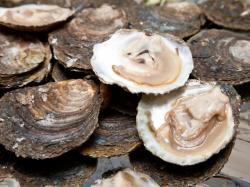Lab-Raised Baby Oysters Planted In Louisiana's Barataria Bay
June 13, 2011 | 1 min to read

HOUMA — Scientists are seeding a public Barataria Bay oyster ground with millions of lab-raised oyster larvae and juvenile oysters in hopes of rehabilitating the grounds to help oystermen struggling after multiple hurricanes and the Gulf oil spill.
The state oyster industry employs 3,500 and has an estimated $300 million economic impact on the state. Louisiana supplies a third of the nation's oysters. But oyster grounds like Barataria Bay have been hit hard by major hurricanes like Rita, Katrina, Gustav and Ike, and the Gulf oil spill.
In an effort to keep oil out of interior wetlands during the spill, the state opened Mississippi River diversions like Davis Pond in the Barataria Basin to full capacity last year, flushing the basin with freshwater. The diversions wiped out as much as 50 percent of the state's oyster crop, and killed a majority of the oysters fished in Barataria Bay by oystermen like Lafourche's Nick Collins.
To read the rest of the story, please go to: The Daily Comet
